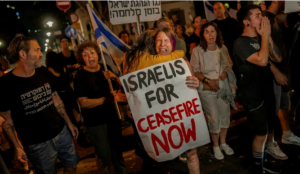Israel is undermining its citizens’ right to protest

An Israeli woman calling for a ceasefire in the Gaza Strip is comforted by another protester after an argument with a right-wing Israeli in Tel Aviv, 4 November 2023
The Haaretz lead editorial on 9 November 2023:
The police’s detention of the head of the Higher Arab Monitoring Committee shortly before a planned protest vigil against the war in the Gaza Strip, coupled with the Supreme Court’s decision to deny petitions against the police’s ban on demonstrations against the war, reflect a worrying erosion of every citizen’s basic right to express himself and demonstrate, including against the government. This right, like other human rights, is not suspended during wartime.
On Thursday, police detained the chairman of the Higher Arab Monitoring Committee, former MK Mohammed Barakeh, for questioning while he was on his way to a protest vigil in Nazareth. They similarly detained former MKs Haneen Zoabi, Sami Abu Shehadeh and Mtanes Shehadeh, who had also planned to attend the protest. Barakeh informed Nazareth’s police chief on Wednesday that at most 50 people would attend the protest vigil, and therefore no permit was needed for it. Police said he was detained on suspicion of trying “to organize a demonstration that might well lead to incitement and disturbances of the peace, in violation of the police’s orders.”
The prevention of this protest vigil is a new and dangerous phase in the state’s treatment of the Israeli Arab community and its leaders. It’s a practical translation of Police Commissioner Kobi Shabtai’s unacceptable comment three weeks ago – “anyone who wants to be an Israeli citizen, well and good. And anyone who wants to identify with Gaza is welcome to. I’ll put him on the buses heading there, and I’ll help him get there.”
The court’s decision this week – to deny petitions filed by the Hadash party and the Adalah organization challenging the police’s refusal to allow antiwar demonstrations planned for Sakhnin and Umm al-Fahm – legitimized this curtailment of freedom of expression. It also provided a tailwind for the state to continue moving in this dangerous direction.
This violation of the Arab leadership’s right to protest should not be seen in isolation from the assault on ordinary Arabs’ freedom of expression. The latter is reflected in the dangerous ballooning of indictments filed by the prosecution over posts on social media. Sometimes fire is also aimed at Jews who dare to criticize the government. The legal system must oppose any attempt at political silencing and protect the fundamental rights of all Israelis, irrespective of religion, race, ethnicity or sex.
This article is reproduced in its entirety
